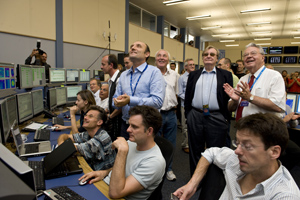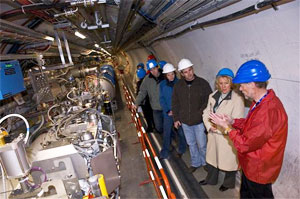by rakesh | Jan 15, 2010 | World News
The Prime Minister Dr Manmohan Singh has conveyed his condolences to Prime Minister Jean-Max Bellerive of Haiti and the people of the Island nation on the loss of lives and devastation in the Jan 12th earthquake and is making an immediate donation of 5 million dollars for relief measures.
The text of the Prime Minister’s message is as follows:
“It is with profound sadness that we have learnt of the vast devastation caused by the earthquake in Haiti on 12 January, 2010.
India stands by the Government and people of Haiti in their hour of need. We would like to make an immediate cash donation of US $ 5 million as a token of our solidarity with the people of Haiti.
I would also like to convey our condolences to the injured and family members of those who have died on account of the earthquake. We have no doubt that the people of Haiti have the strength and resilience to overcome this natural disaster.”
[size=xx-small][Source: PIB][/size]
by rakesh | Dec 25, 2009 | World News
The joint report stressed ‘there has been no decrease in the rates of poverty in the Arab region over the past 20 years,’ with some countries actually showing an increase.
‘Overall poverty remains high, reaching up to 40 percent on average, which means that nearly 140 million Arabs continue to live under the upper poverty line.’ The document entitled Development Challenges for the Arab Region: A Human Development Approach also indicated youth unemployment was ‘the highest in the world’ in Arab countries. …” [Agence France Presse (12/20)/Factiva]
Reuters notes that “…Without more help from Gulf Arab countries, nations such as Yemen, Sudan and Somalia risk missing goals set for the UN Millennium Campaign, which aims to halve extreme poverty and boost life expectancy by 2015, it added.
‘The development paralysis experienced by LDCs (least developed countries) in the Arab region can be turned around,’ the report said. ‘However, such a transformation requires a developmental compact between the Arab LDCs and their more fortunate brothers.’ …The region needs to create 51 million new jobs by 2020 merely to keep unemployment from rising above its current levels, it added. …” [Reuters (12/20)/Factiva]
[size=small][source:worldbank.org][/size]

by rakesh | Sep 10, 2008 | World News
Geneva, 10 September 2008. The first beam in the Large Hadron Collider at CERN1 was successfully steered around the full 27 kilometres of the world’s most powerful particle accelerator at 10h28 this morning. This historic event marks a key moment in the transition...

by rakesh | Sep 8, 2008 | World News
CERN reiterates safety of LHC on eve of first beam A group on a tour of underground facilities Visitors inside the LHC tunnel. Geneva, 5 September 2008. A report published today in the peer reviewed Journal of Physics G: Nuclear and Particle Physics1 provides...
by rakesh | Dec 8, 2006 | World News
Shri J.P. Batra, Chairman, Railway Board has been elected as Chairman of the International Union of Railways (UIC), a prestigious world-wide organization for international cooperation among railways and promotion of rail transport mode, headquartered in Paris, France.
For the past one year, the organization is gearing up for new challenges, in particular, railway liberalization, increasing competition from other modes, the growing economic constraints on railways together with the challenge of globalization of the transport market which creates new opportunities for railways. Shri Batra, who is also presently the Chairman of World Executive Council (WEC) of UIC, an executive body of Chief Executives from different geographical regions of the world and responsible for UIC activities at global level, had led the transformation of UIC to meet the aspirations of all its members across the globe.
The new UIC will focus on the development of intercontinental freight corridors (N.E.W. Corridor, etc.), cooperation within the Metre Gauge, Broad Gauge groups, etc., interactive seminars between customers (railways) and suppliers (world industry), projects in the field of training and strategic management i.e. creation of Inter Railway Strategic Management Institute (IRMSI).
He is the first non-European to be elected for the prestigious assignment. The organization founded in 1922, has 171 members including railways, rail operators, infrastructure managers, railway service providers, public transport companies, etc. spread over all five continents.
Major functions undertaken by UIC involve promoting technical cooperation between its members and maintaining the overall coherence of the railway system, notably at pan-European level, and achieving interoperability which is one of the keys for bolstering rail transport competitiveness. In this context, UIC is responsible for:
· Putting forward specifications and standards to standardization bodies;
· Acting as a technical platform to support the work of railway associations;
· Spearheading international rail cooperation projects which dovetail with its core technical tasks;
· Defining common provisions and recommendations intended for its members; and
· Concluding agreements with Intergovernmental organizations and other trade organizations responsible for transport matters or which cooperate with the railways.
by rakesh | Oct 13, 2006 | World News
Violence against children includes physical violence, psychological violence, discrimination, neglect and maltreatment. It ranges from sexual abuse in the home to corporal and humiliating punishment at school; from the use of physical restraints in children’s homes to brutality at the hands of law enforcement officers; from abuse and neglect in institutions to gang warfare on the streets where children play or work; from infanticide to so-called ‘honour’ killing.
“The best way to deal with violence against children is to stop it before it happens,” says Professor Paulo Sérgio Pinheiro, the Independent Expert appointed by the Secretary-General to lead the Study. “Everyone has a role to play in this, but States must take the primary responsibility. That means prohibiting all kinds of violence against children, wherever it occurs and whoever is the perpetrator, and investing in prevention programmes to address the underlying causes. People must be held accountable for their actions but a strong legal framework is not only about sanctions, it is about sending a robust, unequivocal signal that society just will not accept violence against children.”
The Study, which combines human rights, public health and child protection perspectives, focuses on five ‘settings’ where violence occurs: the home and family, schools and educational settings, institutions (care and judicial), the workplace, and the community.
Extreme violence against children may hit the headlines but the Study concludes that for many children violence is routine, a part of their daily reality.
Although much violence remains hidden or unreported, and figures therefore often underestimate the scope of the problem, the statistics in the report reveal a startling picture. For example:
In 2002, the World Health Organization (WHO) estimates that some 53,000 children aged 0-17 died as a result of homicide;
According to the International Labour Office’s (ILO) latest estimates, 5.7 million children were in forced or bonded labour, 1.8 million in prostitution and pornography, and 1.2 million were victims of trafficking in 2000.
In 16 developing countries reviewed by a Global School-Based Health Survey, the percentage of school-aged children that reported having been verbally or physically bullied at school in the previous 30 days ranged from 20 per cent in some countries to as much as 65 per cent in others;
According to the Study, children in detention are frequently subjected to violence by staff, including as a form of control or punishment, often for minor infractions. In 77 countries, corporal and other violent punishments are accepted as legal disciplinary measures in penal institutions.
Although the consequences may vary according to the nature and severity of the violence inflicted, the short- and long-term repercussions for children are very often grave and damaging. The physical, emotional and psychological scars of violence can have severe implications for a child’s development, health and ability to learn. Studies have shown that experiencing violence in childhood is strongly associated with health risk behaviours later in life such as smoking, alcohol and drug abuse, physical inactivity and obesity. In turn, these behaviours contribute to some of the leading causes of disease and death, including cancers, depression, suicide and cardiovascular disorders.
“No matter whether it occurs in the family, school, community, institution or workplace, health workers are the front line for responding to violence against children,” says Dr Anders Nordström, WHO Acting Director-General. “We must make our contribution to ensuring that such violence is prevented from occurring in the first place, and that where it does occur children receive the best possible services to reduce its harmful effects. States should pursue evidence-based policies and programmes which address factors that give rise to such violence, and ensure that resources are allocated to address its underlying causes and monitor the response to these efforts.”
“Violence against children is a violation of their human rights, a disturbing reality of our societies,” says Louise Arbour, United Nations High Commissioner for Human Rights. “It can never be justified whether for disciplinary reasons or cultural tradition. No such thing as a ‘reasonable’ level of violence is acceptable. Legalized violence against children in one context risks tolerance of violence against children generally.”
“Violence has a lasting affect not just on children and their families, but also on communities and nations,” says UNICEF Executive Director Ann M. Veneman. “We welcome this comprehensive study on the impact of violence against children.”
The report to the General Assembly calls for a wide range of actions to be taken to prevent and respond to violence against children across all the settings where it occurs. Twelve overarching recommendations address areas such as national strategies and systems, data collection and ensuring accountability.
At a global level, the report calls for the appointment of a Special Representative on Violence against Children, with an initial mandate of four years, to act as a high-profile global advocate to promote prevention and elimination of all violence against children and to encourage cooperation and follow-up.


